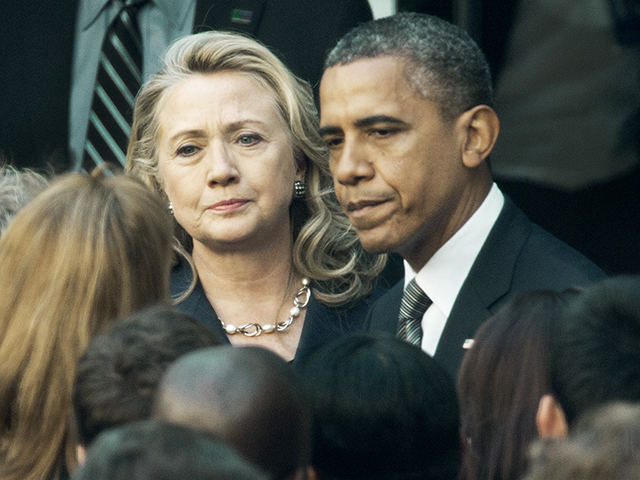Does a Benghazi Select Committee Matter?
Amy Payne /
House Republicans are moving to set up a select committee to investigate the Benghazi attacks. The House could vote this week on establishing the panel, which House Speaker John Boehner (R-Ohio) has said would be led by Rep. Trey Gowdy (R-S.C.), a former federal prosecutor.
Helle Dale, a Heritage expert who has followed the Benghazi scandal closely, said this “could be a giant step toward unraveling the real story behind the Benghazi attack, which cost four brave Americans their lives, and the cover-up that has denied Americans the truth.”
>>> See four essential questions the Benghazi select committee should tackle
What is a select committee, and is this move useful? The Foundry asked Heritage legal expert Hans von Spakovsky.
The Foundry: What is a congressional select committee?
Hans von Spakovsky: Select committees can be set up to perform a particular function, often to perform a specific investigation. They are usually created by a resolution that specifies the duties and powers of the select committee, including when its authority will expire. Such committees are particularly useful when jurisdiction over a particular subject is shared by several regular committees, which can lead to confusion and conflicting actions.
Who sets it up, and what jurisdiction/authority does it have?
In this case, Speaker John Boehner has announced his intention to set up the committee and appoint Rep. Trey Gowdy as its head. The House still has to vote to establish the committee. The resolution setting it up (which hasn’t been released yet) will establish its jurisdiction, but in general, select committees can subpoena and depose witnesses, call them to public hearings, and hire lawyers to work as special investigators.
>>> Remembering Benghazi: A Timeline in Photos
How does a select committee differ from appointing a special counsel to investigate something?
Only the Attorney General can appoint a special counsel to investigate a matter. For example, House Republicans are also talking about asking for a special counsel to look into the IRS’s targeting of conservative nonprofits. The chances of Eric Holder granting that are just about nil.
Does it have the power to punish people?
If, for example, they decided to vote someone in contempt of Congress—for failing to appear or provide testimony—the full House would have to approve that. If Congress had to enforce a contempt citation in federal court, a judge could order the witness who is in contempt to provide testimony, and if the witness doesn’t, the judge could impose jail time or a civil fine. You know, it probably hasn’t been done since the 1800s, but the House does have the power to seize someone who is in contempt of the House. The sergeant-at-arms can seize someone and put them in a jail cell in the House.
What kind of results have select committees produced in the past?
One of the most well-known select committees was the Church Committee chaired by Senator Frank Church (D-Idaho) in 1975 that investigated intelligence gathering by the CIA, NSA and FBI. Its findings led to new laws imposing restrictions on how we gather intelligence, which some believe are at least partly responsible for the intelligence failures related to the attacks on Sept. 11, 2001.
So are select committees focused on producing new laws?
On Benghazi, I think this committee would be driving toward finding out exactly what happened; why the security of the consulate in Benghazi was so inadequate; what failures there were at the State Department and potentially the Pentagon for not being able to respond once the attack started; and coming up with recommendations to prevent anything like this from happening again. In addition to legislative recommendations, they could make recommendations for disciplining or terminating employees if they find wrongful behavior.
It’s been some time since the Benghazi attack on Sept. 11, 2012. Is it helpful to start the investigation now?
A select committee would not have to start from scratch; it would have the benefit of all of the information uncovered to date by the committees in the House of Representatives that have been investigating these matters. But this committee would have the advantage of a single-minded focus on the issue—including dedicated staff—as compared to the regular House committees that have numerous other responsibilities and duties in many different areas.
I had thought this would have happened sooner, but thank goodness it’s finally happening.
Is this just for show, or will it have substance to it?
I think it will have substance to it. And it’s important because four Americans were killed, and it looks like they were needlessly killed—that if the right security steps were taken, they would not have died. I think this is very important for the future safety of American diplomatic personnel.
Read the Morning Bell and more en español every day at Heritage Libertad.
Quick Hits:
- Here’s what the Supreme Court said about public prayer yesterday.
- Should illegal immigrants receive in-state college tuition rates?
- For Nancy Pelosi, Cinco de Mayo is a time to push for liberal immigration policy.
- It’s Teacher Appreciation Week and we want to hear about your favorite teacher.
- WATCH: What everybody should know about the tax code in 15 seconds.


